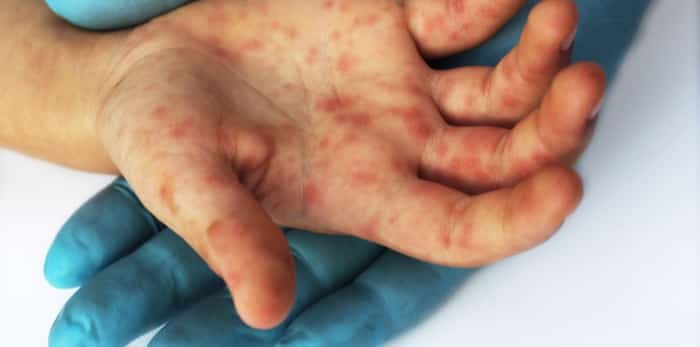There are now two new cases of the measles in Vancouver, bringing the total number of cases to 15.
 Red rashes on the palm of the hand / Shutterstock
Red rashes on the palm of the hand / Shutterstock
Vancouver Coastal Health reported via Twitter Wednesday afternoon that an additional two cases of the virus have been reported. The health authority said both are linked to the outbreak at three Francophone schools — elementary schools École Anne-Hébert and École Rose-Des-Vents, and high school École Jules-Verne.
https://twitter.com/VCHhealthcare/status/1100892156007350272?ref_src=twsrc%5Etfw%7Ctwcamp%5Etweetembed%7Ctwterm%5E1100892156007350272&ref_url=https%3A%2F%2Fwww.vancourier.com%2Fnews%2Ftwo-more-cases-of-measles-reported-in-vancouver-1.23648130
Earlier this week, medical health officer Dr. Réka Gustafson told reporters that while the outbreak is considered “reasonably contained” additional cases could pop up.
“We may get a few more cases because we’re still in what we call the incubation period, so people who were exposed in the previous exposures that we have talked about may not all have developed symptoms,” she said “So we may get additional cases of measles related to that. That does not mean that the outbreak is continuing and there’s ongoing transmission.”
The incubation period for measles is 21 days.
https://twitter.com/VCHhealthcare/status/1100894715275173888?ref_src=twsrc%5Etfw%7Ctwcamp%5Etweetembed%7Ctwterm%5E1100894715275173888&ref_url=https%3A%2F%2Fwww.vancourier.com%2Fnews%2Ftwo-more-cases-of-measles-reported-in-vancouver-1.23648130
The two new cases brings the total number of people infected through the three schools to 11.
In three of the other cases, the infected individuals picked up the virus while traveling overseas. In only one case public health officials have not been able to determine where the person picked up the infection.
The measles virus is highly infectious and can spread through the air when an infected person coughs or sneezes and you do not have to be in close contact with an infected individual to catch the virus.
The virus can survive in a closed area, like a bathroom, for up to two hours after an infected person was there. It can also be spread through sharing food, drinks or cigarettes, and kissing. Someone infected with measles is contagious for four days before they even start showing symptoms and for four days after the onset of the rash.
It can take as few as eight and as many as 21 days to develop symptoms after being exposed to the measles virus.
Symptoms include: fever, red eyes, which may be sensitive to light, cough, a runny nose and rash.
Complications from the virus include pneumonia, inflammation of the brain (encephalitis), seizures, deafness, brain damage and death.
Since the outbreak started, VCH has been recommending that residents ensure their vaccinations are up to date.
The measles vaccine is 99 per cent effective in preventing the virus when two doses have been administered. Children born in B.C. in or after 1994 routinely get two doses of the MMR vaccine — one at 12 months old and a second dose before starting kindergarten.
Vancouver Coastal Health warns that anyone born after 1970 and before 1994, or grew up outside of B.C., may have received only one dose of the vaccine.
The vaccine is available free of charge at public health units or the City Centre Urgent Primary Care Centre (1290 Hornby St.).
For a list of vaccination locations, visit Vancouver Coastal Health.



